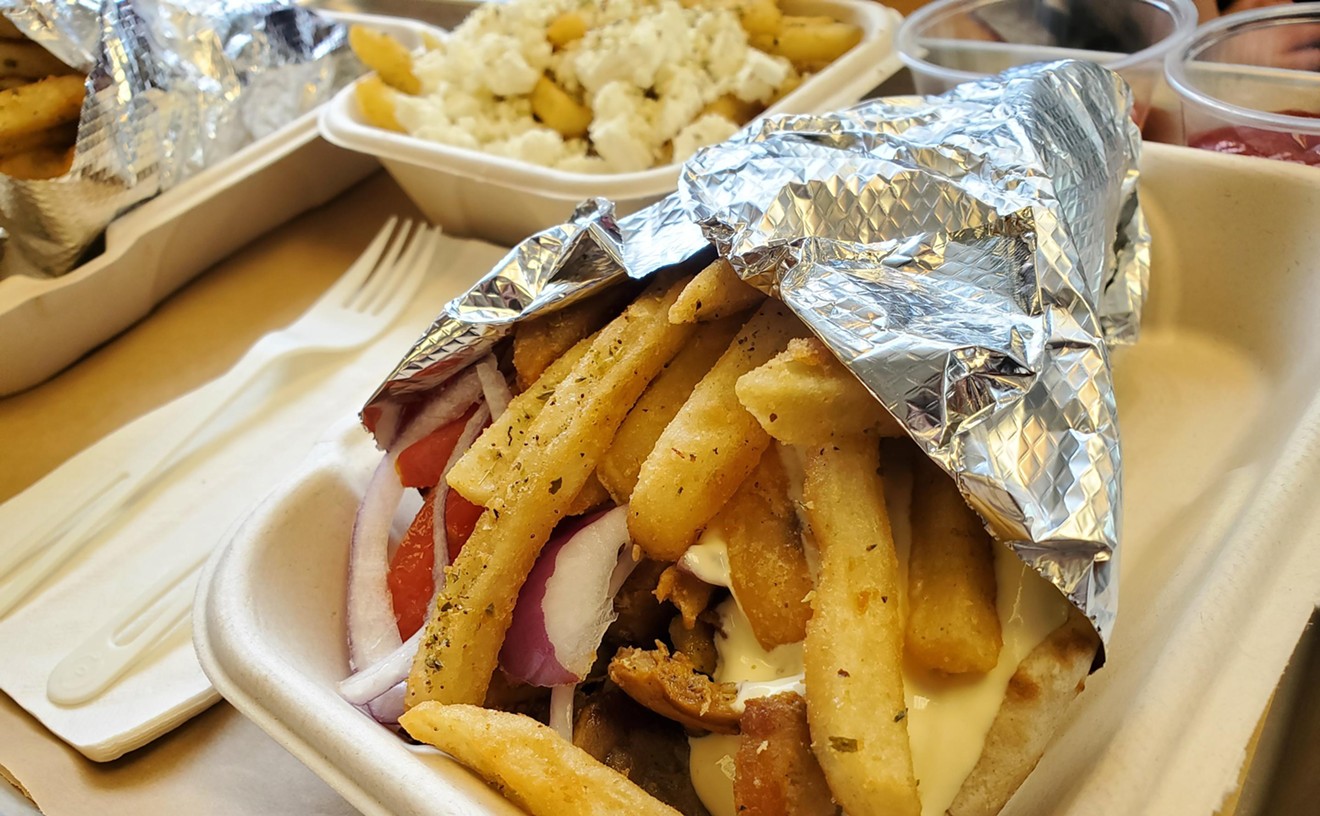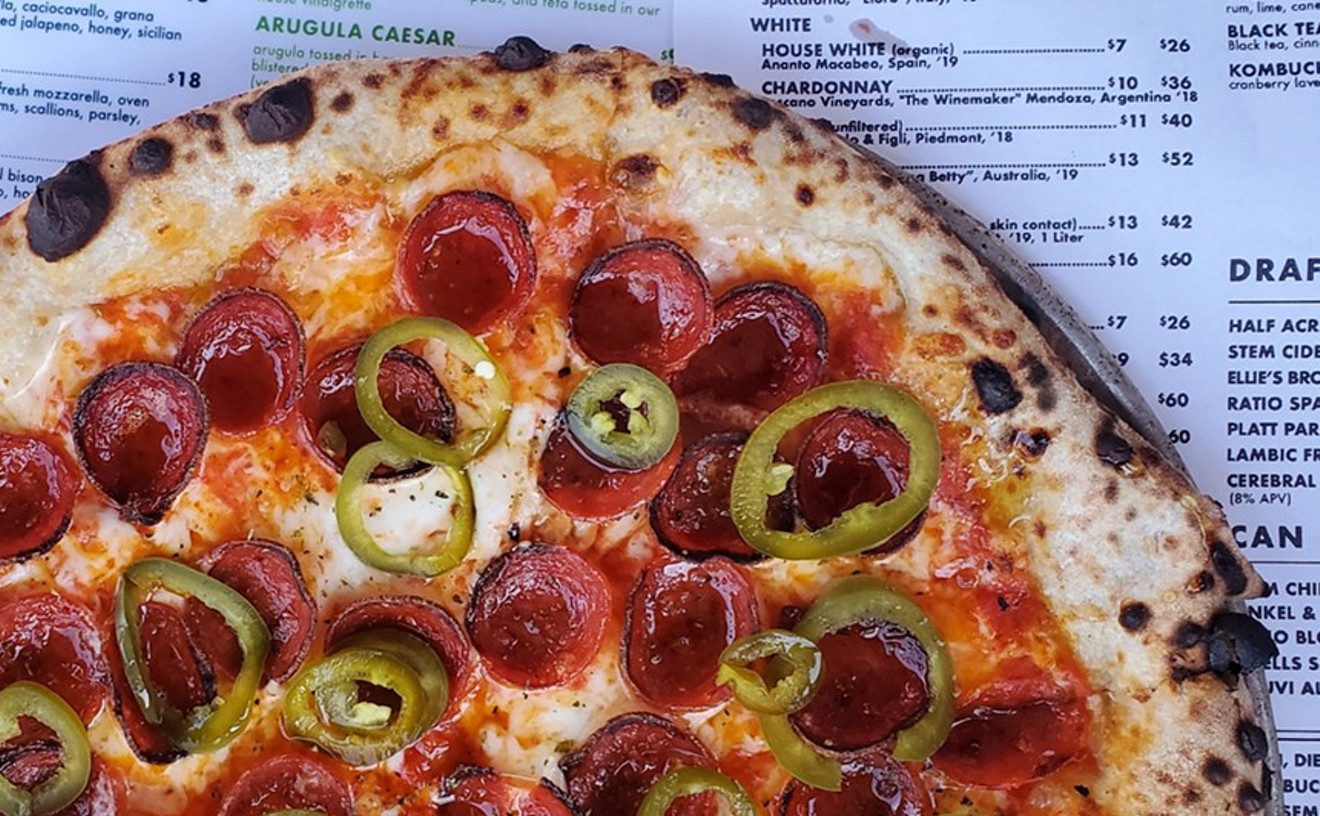Bones executive chef Johnny DePierro is going to have a busy summer: He’s taking on a second job at MiJo, the joint he’s launching with his sous-chef, Michael Nevarez, inside the soon-to-open Avanti Food and Beverage development in lower Highland. While both DePierro and Nevarez will maintain their current responsibilities at the Frank Bonanno-owned noodle bar, they’ll also run the show at the new place, which will focus on a more street-food version of what Bones currently offers.
According to DePierro, MiJo’s name is a combination of his and Nevarez’s first names, a tribute to his Puerto Rican roots (mijo is elided Spanish for “my son”) and a nod to the restaurant where he’s found his stride as a chef. “MiJo is like ‘Son of Bones,’” he explains. The new kitchen will be on the ground floor of Avanti, inside a shipping container — one of several that are being installed to showcase new food concepts from budding restaurateurs looking to test their menus without having to raise the capital for a full brick-and-mortar restaurant.
In many ways, Avanti will mirror DePierro’s childhood in Queens, New York, where he grew up surrounded by international cuisine and split his Sundays helping to prepare meals with his Italian relatives on his dad’s side and his Puerto Rican family on his mom’s side.
“Food was a really strong culture in my family. I remember rolling meatballs, doing this and that, measuring out pasta,” he recalls.
From his mother, DePierro picked up not just the bolder flavors of Puerto Rican cooking, but also the comforting aspect of that food. “If I had a death-row meal, it would be my mother’s rice and beans,” he explains. Made with a salt-pork-and-tomato base, it’s a dish that the chef’s friends constantly pester him to make. “It hits all the sweet, salty and vinegary notes,” DePierro adds. “Whenever I’m missing home, I’ve got a pot on the stove.”
When DePierro was thirteen, his family moved to El Paso, which presented a huge cultural change that he wasn’t prepared for. “I thought there would be tumbleweeds blowing down the streets,” he remembers. His dad told him that wouldn’t be the case, but when the family arrived in Texas, he saw tumbleweeds.
Once he was out of high school, El Paso didn’t hold much interest for DePierro, but he wasn’t sure where he wanted to settle — until he visited Colorado. “I came to Fort Collins; I had a friend who went to CSU,” he says. Within a few days, he realized that he wanted to stay, so he packed up and moved to northern Colorado, working in kitchens, but with a general notion that maybe he would enroll in school there. “That’s pretty much how my life works,” he adds. “I decide to do something, and a week later I do it.”
By now DePierro had realized that his passion for cooking could become a career, so rather than attend college at Colorado State University, he eventually moved to Denver — after following Phish on tour for a while — to enroll in the culinary program at the Art Institute of Colorado. After graduating, DePierro got his first big break at 27, when he was named executive chef at Aix, a French restaurant in the space that’s now home to Beast + Bottle. Despite the restaurant’s Provençal leanings, DePierro began gravitating toward Asian flavors and techniques, and his menus were increasingly influenced by ingredients from Japan and China.
A stint at TAG was a better fit for that growing interest. “That was right up my alley,” he says. “It was the most talented kitchen I’d ever worked in.” It was also a huge learning experience: “You realize that, ‘Man, I’m not the best chef in the kitchen.’ It took about two weeks before I realized I didn’t have it all figured out.” That experience pushed DePierro to work harder and improve his skills so that he wouldn’t be just another cook on the line.
His dedication paid off, and he was invited to stage at Luca as a tryout for a job opening there. He thought he had blown it when a former Bonanno employee got the job instead, he says, “But they called me and said, ‘Bones is hiring for a sous.’” He wasn’t the sous for long: “Two months later, they put me on as [executive] chef, and I’ve been rockin’ and rollin’ ever since.”
Working there for the past three years has given DePierro plenty of opportunities to develop his own style and delve deeper into Asian cuisine, with modern twists. “Frank and Jacqueline [Bonanno] really support us; I really believe in it,” he says of Bonanno’s small restaurant empire, adding that Bonanno is very hands-off and gives his chefs the freedom to create.
That freedom came with a little uncertainty at first. “I was cooking what I thought people wanted me to instead of what I needed to cook,” he says of his first months heading the kitchen at Bones, where it was tough “getting handed this and Frank saying, ‘Okay, let’s see what you’ve got.’
“We got a little too weird too quickly,” he admits of some of his first experiments. But he eventually found his stride and figured out what guests were willing to take chances on. “I love our customers. They’re more trusting of what we can do,” DePierro says.
Among the ingredients he’s working with right now, DePierro points to black garlic and beef tendon as favorites. The chef uses tendon, common in Vietnamese noodle soups, in a kung pao dish; he cooks the tricky cut sous vide for two days before frying it to accentuate its unctuous texture. “It’s the new marrow,” he claims, adding that marrow was a difficult sell at first, too. “I feel like Denver’s getting there.”
DePierro’s not the only one innovating at Bones. “We open up the menu to everyone in the kitchen,” he explains. He and his crew can regularly offer specials that aren’t part of the ongoing menu; they include Korean- and Japanese-inspired dishes as well as those with European influences. Right now, for example, he’s working on a foie gras dish that’s served in a pop-top can (Bonanno recently purchased a small canning machine for these kinds of specials).
In addition to working at Bones, DePierro also devotes time to this year’s Denver Five, the group of local chefs and beverage experts who hold several events at their restaurants and at the Aspen Food & Wine festival before heading to New York City to represent Denver at the James Beard House. “They all knew each other, and I came in as the new kid on the block,” he says of this year’s group. He’s looking forward to returning to his home town later this year, when he’s hoping to cook for family and to “try to catch a Yankees game or two.”
Foremost on his mind, though, may be hammering out the details of his new menu at MiJo with Nevarez. It will be an izakaya-style list with street-food flair, he anticipates, “something familiar, but with a twist” — and definitely not ramen, he says, adding that “there’s a lot of regurgitation of ideas going on.” MiJo will feature noodle soup, but it will be udon rather than ramen. And there will be plenty of seafood, too: “If there’s a hierarchy of proteins, fish is probably on the top of that list.”
DePierro’s background is apparent not just in MiJo’s name and menu, but in the logo: a stylized fish skeleton with a heart-shaped head. The name and that logo bring together everything he loves: his Hispanic roots, the “bones” of his current job, the fish that’s such an important part of his cooking. An eighteen-month lease at Avanti will give him the opportunity to test this combination of influences before expanding MiJo to a stand-alone eatery — maybe even more than one.
With the support of successful restaurateur Bonanno — “he’s offering his tutelage and backing,” DePierro says — bolstering the chef’s own passion and skill, MiJo could one day spawn sons of its own.
[
{
"name": "Air - MediumRectangle - Inline Content - Mobile Display Size",
"component": "12017618",
"insertPoint": "2",
"requiredCountToDisplay": "2"
},{
"name": "Editor Picks",
"component": "17242653",
"insertPoint": "4",
"requiredCountToDisplay": "1"
},{
"name": "Inline Links",
"component": "18838239",
"insertPoint": "8th",
"startingPoint": 8,
"requiredCountToDisplay": "7",
"maxInsertions": 25
},{
"name": "Air - MediumRectangle - Combo - Inline Content",
"component": "17261320",
"insertPoint": "8th",
"startingPoint": 8,
"requiredCountToDisplay": "7",
"maxInsertions": 25
},{
"name": "Inline Links",
"component": "18838239",
"insertPoint": "8th",
"startingPoint": 12,
"requiredCountToDisplay": "11",
"maxInsertions": 25
},{
"name": "Air - Leaderboard Tower - Combo - Inline Content",
"component": "17261321",
"insertPoint": "8th",
"startingPoint": 12,
"requiredCountToDisplay": "11",
"maxInsertions": 25
}
]











